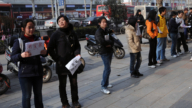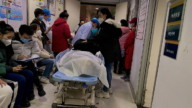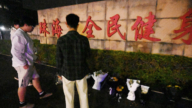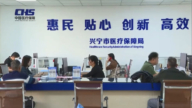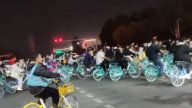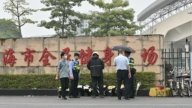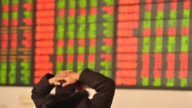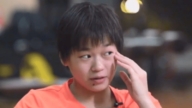【新唐人2013年11月09日訊】今年11月8號是第14個「中國記者節」,但是由於最近發生的「陳永洲事件」一波三折,讓記者這一行業成了醜聞主角。今年的記者節日不僅沒有慶祝的喜慶,反而都是應該「自律」、「反思」的報導。更嚴重的是還有媒體指稱,金額超過百萬的新聞敲詐案正在調查之中。請看報導。
中國僅有三個以職業命名的節日——教師節、護士節、記者節,中國記者們今年的心情卻另有別樣。
不久前,廣東《新快報》記者陳永洲,因刊發了多篇涉及一家湖南上市公司的報導而被捕,最初被視為是一宗「記者因輿論監督遭受司法迫害」的冤案,但隨著陳永洲在《央視》上承認了收「黑錢」寫報導,從而讓局勢大逆轉,官媒一致譴責記者受賄。頭頂「無冕之王」光環的記者職業,也成了討伐的目標,人們鞭韃的對像。
今年的記者節,有人說要吸取教訓,有的說要自律,有的還提議把記者節「作為反思日。」
中國政論專欄作家朱建國表示,即使陳永洲受了賄,也不能說明他揭露的事實是假的,當局用這個錯誤的邏輯誤導民眾。
中國政論專欄作家朱建國覆:「巢之下無完卵,在一個腐敗的社會裏,可能每一個行當都難倖免,那麼新聞界出現腐敗也很正常。同樣是腐敗,這裡有主次之分,那麼官員、執政黨,他是腐敗的源頭,罪魁禍首。」
媒體、記者的噩夢還沒有停止:曾遭遇負面報導的「農夫山泉」企業,日前舉報了《京華時報》,指稱《京華時報》捏造事實進行虛假報導,使公司嚴重受損。
另外,香港《明報》也透露,一宗涉嫌新聞敲詐的案件,金額超過百萬元人民幣,正在調查當中。
前《山西青年報》記者高勤榮,因報導山西運城貪腐案,被關冤獄8年。
高勤榮:「記者收紅包在中國是有這種現象,而且有一些不良文人收封口費確實比較多,但是這個也就是由於法制不健全、制度不健全造成的。」
早在2003年,美國的一項研究就顯示,在66個國家「有償新聞」指數排名榜上,中國新聞界「雄居」第一位。
一位曾擔任地方縣長的官員日前也透露,一年收到的近百封記者信件中,絕大多數是以發所謂「負面報導」為籌碼,謀求紅包、吃飯、訂報紙等不同目地。
旅居美國的中國經濟學者何清漣用「大黑吃小黑」的評語,對陳永洲事件做了總結。她說:陳永洲事件揭開了中國政界、企業界與媒體業相互為用、大黑吃小黑的三重黑幕,企業之間挾政治勢力的惡性競爭、在權力與金錢下遊走的中國媒體、權力介入每個角落並扭曲一切。
時事評論員夏小強:「中共控制下的所有媒體都是黨媒、黨的喉舌、它其實是黨的工具,目地是隱瞞真相和維護權力。」
北京外國語大學新聞系教授展江,也在他的專欄中指出,不拿紅包的記者遠遠少於拿紅包的記者。目前的一個現實是:媒體自身普遍「,腐敗的記者和媒體再去揭露別人的腐敗。這就陷入了一個奇怪的怪圈。
朱建國:「在今這種大腐來反腐的情況下,只有靠小腐反戈一擊揭露大腐,這個社會才能真正前進。即使一個腐敗的記者,他又檢舉了腐敗,他依然是正能量,依然有益社會。」
朱建國說,腐敗記者也可以立大功。
採訪/陳漢 編輯/宋風 後製/蕭宇
China Journalist’s Day Follows News Extortion Case
And Scandals
Nov. 8 2013 is the 14th China Journalist’s Day.
But the recent “Chen Yongzhou incident" makes the
journalism industry become the center of scandals.
This year Journalist’s Day doesn’t have an atmosphere of
happiness but many reports of self-discipline and self-reflection.
More seriously, there’s a report saying news extortion with
millions of dollars involved is being investigated.
Let’s see the report.
There are only three holidays named after careers:
Teacher’s Day, Nurse’s Day, and Journalist’s Day.
Chinese journalists have different feelings this year.
Chen Yongzhou, reporter at Guangdong newspaper
New Express, was arrested for writing several reports
about a company in Hunan Province.
The case was initially considered injustice due to the
persecution of the reporter’s opinion supervision.
But the situation changed when CCTV aired Chen’s
confession for taking bribes to do the reports.
Chinese official media unanimously condemned
the reporter for taking bribes.
The journalism career used to be respected,
but now has become the target of condemnation.
During the Journalist’s Day this year, some people say
they should learn the lesson.
Some others say they should use self-discipline.
Some also suggested making Journalist’s Day
into “Reflection Day".
Chinese political commentary columnist, Zhu Jianguo says
that even if Chen Youzhou had taken bribes, that didn’t mean
what he reported on was untruthful.
The authority is misleading people with this wrong logic.
Zhu Jianguo: “There’s no good egg in a turned over nest.
No career can avoid corruption in a corrupted society,
including journalism. It’s normal to have corruption everywhere.
There’s priority and minority among corruptions. The
corruption of officials and ruling party is the root, the culprit."
The nightmare of media and journalists has not stopped.
Nongfu Spring company recently reported Beijing News
newspaper for fabricating facts to make false reports.
This led to severe economic loss for the company.
Hong Kong newspaper Ming Pao reveals a news extortion
involving over a million RMB is under investigation.
Former reporter at Shanxi Youth Newspaper Gao Qinrong
was sentenced to eight years when reporting a corruption
case in Yucheng of Shanxi Province.
Gao Qinrong: “There are phenomenona of taking bribes
among journalists in China.
But there are truly a lot of solars taking hush money, which
is also caused by an unsound legal and social system."
There was a survey conducted by the United State in 2013
that China has the most paid news reporting among the 66
countries that are on the ranking list.
A former Chinese county official recently revealed that the
majority of the 100 letters or so he received in a year when
he was in the position were bribes for negative reports,
asking for bonus, inviting meals, ordering newspapers etc.
He Qingliang, Chinese economist living in the US,
made commentary on the Chen Yongzhou incident.
She says, “The Chen Yongzhou incident revealed three
inside stories of Chinese politics; collusions between
enterprises and media, as well as double-crossing.
Enterprises have unhealthy competitions using
political power.
Chinese media is used by power and money. Power is
involved in every corner in Chinese society."
Political commentary Xia Xiaoqiang: “All the media under
Chinese Communist Party (CCP) rule are party mouthpieces.
Media is the tool of the CCP for the purpose of hiding the
truth and maintaining power."
Zhan Jiang, journalism professor at Beijing Foreign Studies
University pointed out in his column that there are many
more reporters who take bribes than who don’t in China.
The current fact is that media corruption is common.
Corrupt reporters and media reveal each others’ corruption.
This is a vicious circle.
Zhu Jianguo: “To fight corruption under such corrupted
environment in China, we can only rely on small corruption
to reveal the big corruption to make development in society.
Even if a reporter is corrupt, but he reports a big corruption,
story then he’s still a positive power, still benefiting society."
Zhu Jianguo says corrupt reporters can also hit the big time.


